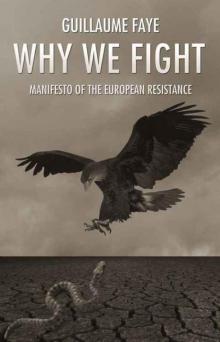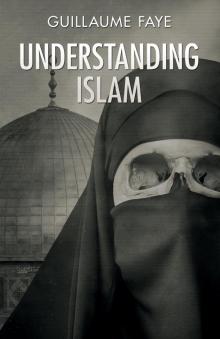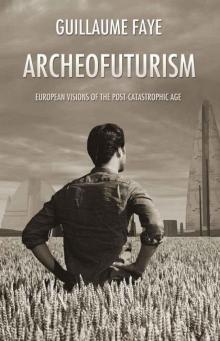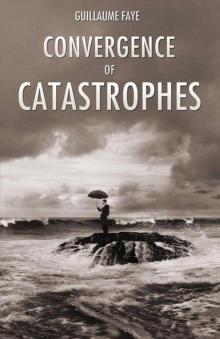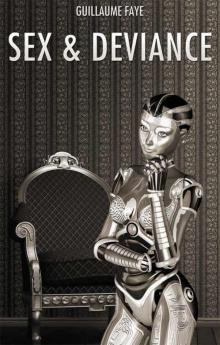Why We Fight, page 21




*
The paradox of this new primitivism, veritable process of ‘decivilisation’, is its association with the dominant devirilised ideology, which advocates civility, the rule of law, altruism, humanitarianism, citizenship, and ‘culture’. But this is eyewash. Neo-primitivism perfectly accommodates social control, domestication by consumerism, and the collective loss of civic spirit. It’s the counterpart of neo-totalitarianism. It serves the short term strategy of the political class, the intellectual-media class, and, above all, the transnational financial powers. If one reasons dialectically, this neo-primitivism could well turn against the civilisation engendering it — to the degree that the present generation of youth will be technologically incapable of performing the functions that make such a civilisation possible.
*
This generation will offer but the most minimal resistance to active minorities, whoever they may be. What could such a mass of slaves — these ‘last men’ of whom Nietzsche spoke[186] — do in face of a resolute aristocratic minority?
(see deculturation; involution; mass, massification)
* * *
Nihilism
A profound belief in the absence of all ‘meaning in life’: the annihilation of superior values; a cynical, dispirited tendency to despise the principles of action, even to believe that they no longer exist.
Nihilism (from the Latin nihil, ‘nothing’) characterises an era when everything has become equivalent, when all authentic sense of the sacred has gone, when the principal preoccupation is consumerism and immediate materialism. Vitalist values (related to the conservation of a line, the defence of a land, the communal spirit, concern for future generations, the perpetuation of traditions, aesthetics, etc.) collapse for the sake of a dissimulating ethic of false values (the humanitarian, anti-racist, democratic vulgate, pseudo-social or ecological discourses at odds with the facts, etc.). Nihilism is the direct offshoot of the bourgeois spirit — obsessional, egoistic, and calculating. The system’s dominant preoccupations, similarly, are short-term financial gain, the maximisation of profit, and the exclusion of every other consideration, even those of health.
This attitude is fundamentally nihilist because it holds that nothing is of value except immediate materialist concerns. It represents the collapse of all historical consciousness and a refusal of every transcendence beyond individual materialist egoism. We are living today the apotheosis of nihilism: individual uprootment, the triumph of the market for the market’s sake, and the dissolution of authentic meaning in life. The pursued ‘happiness’, though, is obviously no rendezvous, but the reverse, something even worse: despair. This is evident, for example, in the suicide rate, but also in the morbid, noxious forms of contemporary art, in the lowering of comedy to the rank of derision, the replacement of laughter by sniggers, of tragedy with lamentation.
*
We are living through an implosion of Western ideologies, the generalisation of narcissism, the demographic suicide of Europe, and the dictatorship of a meaningless world speeding toward catastrophe.
Some see Islam as a remedy to nihilism. Islam, it’s true, is anything but nihilistic. The problem here is that it entails exchanging one evil for another, given that Islam’s aim is the destruction of European civilisation. Only an explosion can cure Europe of her nihilism. For when their physical and material survival is threatened by great crises, men, paradoxically, rediscover the transcendent in their lives. After a certain degree, regeneration entails tragedy.
(see convergence of catastrophes; sacred; society, market)
O
Order
Order is the basis of every creative civilisation, because it disciplines man’s anarchistic animal nature through its political and cultural harmonies.
Order is unacceptable if it’s not disciplinary, educative, selective — if it’s purely repressive in service to a frozen elite. Any notion of order needs, though, to be treated with caution, for it can be stimulating or enervating, a source of vigour or of sclerosis. There is no order without a project, without enthusiasm, without a movement. Order is not simply repressive (the American syndrome), but a form of support, an attraction, a disciplined constitution of a common ideal.
An authentic order is found in the community of homogeneous, self-disciplined people, animated by the spirit of Aristotelian philia, friendship, and spontaneous solidarity. Order and harmony go together. In the European tradition, order isn’t a static state, but the organisation of a shared becoming.
(see discipline; liberty)
P
Paganism
The philosophic and/or religious attitude, generally polytheistic and pantheistic, that is the antipode to the revealed salvation religions, to religious or secular monotheism, or to Western materialism.
For Christopher Gérard,[187] one of the principal contemporary practicing authorities on the subject: ‘Paganism, as a coherent vision of the world . . . is faithful to an ancestry, considered part of a very long memory, enrooted in multiple terrains, opened to the invisible . . . an active participant in the world, a sought-after harmony between microcosm and macrocosm. Paganism in essence is a natural religion, the most ancient of a world “born” with its birth — if the world were ever born. Rather than an eccentric fad — or the elegant nostalgia of literary refugees from some mythic Golden Age, I think paganism is on the way to becoming the first of the world’s religions.’ [188] He mentions 1.5 billion pagans on five continents, which would make it the world’s largest religious group. Gérard adds, ‘Without being narrowly moralistic . . . a lived paganism seems to me incompatible with whatever makes man servile. As the exaltation of life — of the eternal élan — paganism refuses everything that debases man: drugs, dependencies, every kind of unhealthy life’. A lived paganism, in other words, is not destructuring, nor linked to the permissive, anti-vitalist mores of the present West (as certain prelates would have us believe). Gay Pride has nothing in common with the pagan bacchanalia! Paganism, moreover, is neither superstitious nor vacuously ritualistic, in contrast to Islam (this belief system which is most opposed to it), for Islam is all these things to the highest degree.
*
Pierre Vial has written that paganism is not anti-Christian, but a-Christian and post-Christian. ‘To be pagan is to refuse the inversion of values that Nietzsche denounced in Christianity. It is to take the hero, not the martyr, as the model. Christian suffering has always repulsed me. To celebrate the redemptive value of suffering seems like a form of masochism’. (Today, modern European Christians practice their ethnomasochism and culpability on the immigrant colonisers; in every domain they practice the ‘duty to repent’.) Vial continues, ‘To exalt wretchedness, suffering, and sickness is unhealthy and I much prefer the Greek ideal of transcendence or the Stoicism of Marcus Aurelius.[189] Paganism ought not, though, to be confused with anti-clericalism or atheism. Another point: a purely intellectual definition of paganism . . . won’t suffice. It’s perhaps necessary, but it doesn’t go far enough. For paganism to exist, it must be lived. Not simply in gestures, but in life’s most ordinary expressions. Paganism is defined primarily in reference to the sacred . . . It affirms the immanence of the sacred’.[190]
For both Gérard and Vial, paganism is the authentic ‘religion’, for it ties men of the same community together and ties them to a cosmos in which the divine is everywhere, where the gods are not separated from, but part of, the profane world.
*
Similarly, gnosticism, which inspires Freemasonry, has nothing to do with paganism. Paganism’s constituting traits are: the presence of the sacred and the supernatural within nature; a cyclical or spherical conception of time; the refusal to consider nature the ‘property’ of the men who exploit and thus destroy it; the coming-and-going of sensuality and asceticism; the unqualified apology of the life-force (the ‘yes to life’ and ‘the Great Health’ [191] of Nietzsche’s Zarathustra); the idea that the world is ‘uncreated’ and corresponds to a river of becoming, without beginning or end; the tragic sentiment of life refusing all nihilism; the cult of ancestors, of the line, of our people’s biological and cultural identity; the refusal of all revealed and universal Truths and thus the refusal of all fanaticism, dogmatism, and forced proselytism.
We need to beware, though, of certain so-called pagans who hold that paganism stands for ‘absolute tolerance’, in the name of ‘social polytheism’. Such pagans, like the post-conciliar Church, support, for instance, immigration and Islam and refuse to struggle against the reigning social decadence. This pseudo-paganism of secular clerics gives the pagan spirit a Leftish slant. It’s a pseudo-paganism, in effect — purely negative and reactive, a hollow Judaeo-Christianity, an anti-Catholic fixation.
It’s not a philosophy of life, but an attitude of resentment. Besides, these pseudo-pagans, who lack true culture, have never been able to define nor positively live their assumed ‘paganism’. In a totally absurd way, it’s even led them to a pro-Islam position (whose Qur’an considers pagans ‘idolaters’ — and whose lot is that of the Eid al-Adha’s slaughtered sheep[192]) — and to the egalitarianism of absolute toleration for every form of deviance, justified in the name of a purely casuistic ‘social polytheism’ (homophilia, anti-racism, ethnopluralism, tribalism, etc.). One doesn’t even have to criticise the Church to assume the position of Monsignor Gaillot[193] and the post-conciliar humanitarians.
Against this, we affirm that paganism is in essence a partisan of social order — which it sees as reflecting the cosmic order; it equally opposes the fusion of peoples, random mixing, and thus a massifying individualism. The pagan vision of the world is holistic and organic and views its people as a hierarchical community of destiny. Like ancient Greek paganism, the notion of the City, inseparable from notions of patriotism and ethnic identity, is fundamental to the pagan conception of the world. Similarly, Nietzsche’s notion of the will to power perfectly accords with paganism (to the degree it respects the natural, cosmic order).
In Europe, paganism — her ancient religion, far older than Christianity — has taken several forms: first, there’s a ‘philosophical’ paganism (or neo-paganism), with Hellenic, Roman, Germanic, Scandinavian, etc., components, all of which hold no belief in anthropocentric gods, but rather in a sacred, polytheistic, and pantheistic vision of the world, in which the divinities are eternal allegories representing the multiplicities of life and cosmos; this paganism knows numerous communal rituals linked to the different stages of human life and to the seasonal cycles; it’s been evident in European art for centuries. There’s also a ‘wild’ paganism that stretches from the (pseudo-pagan) New Age to European Buddhism. Another false paganism is intellectualist paganism, which is often just a form of anti-Catholic hatred; what Gérard calls ‘salon paganism’. And finally, there’s the latent or implicit paganism of traditional Catholicism and Orthodoxy, especially evident in their polytheistic cults.
There’s no pagan ‘Church’. Paganism isn’t sociologically unified — one needs to speak of paganisms. The word itself is ambiguous, coined by Christians to designate the religion of peasants (pagani).
It might also be noted that sects belong neither to paganism nor its philosophy, but to derivations of the mystic monotheistic salvation religions.
*
Pagans today need to have the intelligence and wisdom not to — a priori — reject traditional Christians, and vice versa, for the struggle against the common enemy is what’s most important. Not sectarianism, but a historic compromise, is needed here. No reconciliation, by contrast, is possible with the Judaeo-Christianity of the post-conciliar Left.
The main pagan reproach of Christianity (as made by Pierre Vial, Giorgio Locchi, and Louis Rougier[194]) is its roots in universalism and egalitarianism and its progressive view of history; totalitarian ideologies of salvation, such as globalist liberalism, with its end to history and its disarming humanitarianism, are simply secularised forms of Christianity. Universalism, for example, has been transformed into a secular cosmopolitanism, and Christian charity into a masochistic humanitarianism. Universal charity, as it comes from Judaeo-Christianity and clashes with the pagan world vision, has been central to Europe’s moral disarmament, to its failure to resist the Third World’s colonising invasion. Similarly, in situating God outside or above the universe and declaring the latter profane, Judaeo-Christianity opened the way to an atheistic materialism. Following Augustine[195] and Aquinas,[196] traditional Christianity claimed that the equality and universality of men before God is destined not for the City, but for the beyond, following the Last Judgment.
We need, henceforth, to recognise that the egalitarian, universalist, and anti-nationalist virus of the early Christians, neutralised by the Medieval Church and by chivalry, has returned in force with the modern post-conciliar Church.[197] Traditional Christianity, whether Catholic or Orthodox, incorporated important pagan elements, notably in the polytheism of the Holy Trinity, the cult of the saints and the Virgin Mary, etc. We might also mention Pelagius,[198] Teilhard de Chardin,[199] Giordano Bruno,[200] or other Churchmen who attempted a synthesis of European Christianity and paganism.
The most important thing today is to confront the common enemy, Islam — the most abstract, the most intolerant, the most dangerous of the monotheistic religions (founding model of totalitarianism, even more so than Communism), with which, unfortunately, the Catholic hierarchy and our pseudo-pagan ‘ethnopluralist’ intellectuals suicidally collaborate. In the course of the Twenty-first century, it’s not unreasonable to expect that authentic pagans in Europe and India will be the ones manning the front line in the struggle against the desert’s totalitarian religion — not Catholic clerics or republican ‘secularists’.
It would be vain to instrumentalise paganism as a ‘political religion’. For paganism is above all an attitude, a philosophical, spiritual positioning, a choice of values, and in no case does it have a vocation to institutionalise itself as a religion — as a ‘new Church’. European Catholicism — before it was desacralised by Vatican II — included important pagan elements, to such a degree that certain modern theologians accuse it of having been a ‘pagano-Christianity’ — the same reproach Luther and Calvin made of it. Slavic-Greek Orthodoxy still retains many pagan remnants.
The historic alliance of authentic pagan philosophers (inspired by the heritage of Greece, Rome, and India) to traditional European Christianity is a prerequisite to the merciless struggle that is to be waged against the Masonic gnosis, the obscurantism of the Muslim colonisers, and the virus of materialism.
(see Judaeo-Christianity)
* * *
People
An ethnic ensemble — biological, historical, cultural — with a territory, its fatherland, in which it is rooted.
‘The people’ — the very term is suspect to the cosmopolitan Left, which sees it as bordering on the politically incorrect — is not any statistical ‘population’; it’s an organic community embracing a transcendent body made up of ancestors, the living, and their heirs. Though marked with a certain spirituality, a people is diachronically rooted in the past and projects itself into the future — it’s submerged in biological and genetic matter, but at the same time it’s a historical, and spiritual, reality.
It’s belonging to a specific people that distinguishes a man and makes him human. Though modern Western egalitarian doctrines reduce peoples to indifferent socioeconomic aggregates, peoples actually constitute the organic bases of the human race; similarly, such doctrines conceive of the ideal man as an individual ‘emancipated’ from his organic attachments — like an undifferentiated cell in a human magma.
It’s necessary to recall, especially for certain Christians, that a people’s attachment is incompatible with Christianity’s present cosmopolitanism. The claim, for example, that ‘I am closer to an African Catholic than I am to a non-Christian European’ is a universalistic claim that relegates a people’s nation to something of secondary significance. This is, indeed, the great drama of European Christianity, marked as it is by Pauline universalism. A Catholic attached to his people and conscious of the biological and cultural dangers threatening them might instead say, ‘I respect all the Christians of the world, but hic et nunc[201] I fight for my people above all, whatever their religion’.
The Jesuit spirit might resolve the contradiction in reference to the Old Testament’s Hebraic tradition: ‘Babel — the mélange of disparate peoples — is a punishment from God, Who wants His peoples to be separate and diverse — humanity is one in Heaven, but multiple on Earth’.
Arab Islam has no difficulty reconciling the notion of people (the ‘Arab nation’) with that of its universalism. The Jews, on their side, have similarly reconciled a ferocious defence of their ethnicity — their singularity — with their religion, however theoretically monotheistic and universalist it may be. At no moment have Judaism and Islam, unlike the Christian Churches today, engaged in doubting, guilt-stroking diatribes against ‘xenophobia’ and ethnocentrism. They are not masochistic . . .
*
Like every anthropological notion, ‘people’ lacks mathematical rigour. A people doesn’t define itself as a homogeneous biocultural totality, but as a relationship. It’s the product of an organic alchemy that brings various ‘sub-peoples’ together. The Bretons, Catalans, Scots, etc., can be seen thus as the sub-peoples of a larger people — the Europeans.
*
We ought to highlight the ambiguity that touches the notion of the people. The universalist ideology of the French Revolution confused the idea of the people with that of an ‘ensemble of inhabitants who jurisdictionally possess nationality’, whatever their origin. Given the facts of mass immigration and naturalisation, the notion of the French people has been greatly diluted (as have the British or German peoples, for the same reason). This is why (without broaching the unresolvable issue of what constitutes a ‘regional people’ or a ‘national people’), it’s advisable to dialectically transcend semantic problems — and affirm the historic legitimacy of a single, European people, historically bound, whose different national families resemble one another in having, for thousands of years, the same ethnocultural and historical origins. Despite national, linguistic, or tribal differences, haven’t African Blacks, even in Europe, been called on by Nelson Mandela or the Senegalese Mamadou Diop[202] to ‘think like one people’? From Nasser[203] to al-Qadhafi, by way of Arafat, haven’t Arabs been urged to see themselves as an Arab people? Why don’t Europeans have the same right to see themselves as a people?

